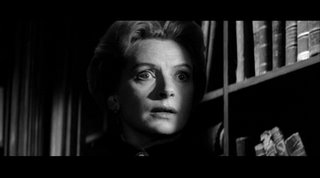The Innocents: All of Modern Horror's Promise, Held in its Grasp

For decades, I've known the hallowed reputation held by The Innocents, Jack Clayton's magnificent 1961 cinematic adaptation of Henry James' novella The Turn of the Screw. But I only caught up with it last week, and I could kick myself--repeatedly--for having let the movie elude my grasp for so long (Fox issued it on DVD late last year). As a horror tale, as a psychological study, and as a work of art, it rivals anything produced by any major studio at the time. Only Robert Wise's nigh-peerless The Haunting comes close.
The basic storyline details the travails of Miss Giddens (Deborah Kerr), a quintessential proper Englishwoman who's accepted a job as governess to two precocious youngsters, Miles (Martin Stephens) and Flora (Pamela Franklin). Giddens takes to her two bright and initially pleasant charges, until their behavior begins subtly--and scarily--changing with time.
Those changes force the governess to dig further into the history of the house and its residents, in particular the kids' recently-deceased previous nanny and the house's late gardener, Quint. Soon it's apparent that dark forces from beyond the realm of the normal are taking root in the children.
Or are they? The Innocents offers no easy answers, and therein lies much of its brilliance. We see and hear all of the strange things that lead Miss Giddens to her horrifying conclusions, but none of the other characters do. This woman could be going crazy herself, or she could be on the cusp of a monumental battle with Quint's malignant spirit.
The movie stands on the cusp of some serious changes within the film industry (and within public mores and tastes). In hindsight it straddled them with astonishing grace, hinting at--but never explicitly stating--pronounced criticisms of the British Class system, the dysfunctionality gnawing at the interior of 'old-fashioned' upbringing, and other, more unsavory elements like incest and reverse pedophilia. In this context, the treatment of the kids shows amazing--and realistic--restraint. Turning children into potential threats was still novel and controversial at the time (though The Bad Seed, released five years previous, had already broke that particular taboo), but The Innocents portrays Flora and Miles neither as demons, nor adorable moppets: most radically, it portrays them as smart regular kids under the corrosive influence of someone...or something (if a major studio remade The Innocents today, we'd get Cameron Bright as Miles, glowering cartoonishly up at the camera for the entire running time).
That element of subtly but decisively steering horror film conventions into previously-uncharted realms of the cerebral as well as the visceral tinctures every aspect of The Innocents. You can almost feel the wonderful Deborah Kerr shaking loose relievedly from the shackles of her saintly onscreen persona as she explores Miss Giddens' insides, subverting the character's earnestness by letting the viewer see the tint of steely fanaticism underneath her ostensibly noble facade. Clayton likewise sets horror tradition on its ear with direction that never settles down to manipulate the viewer into belief--or disbelief (his work is immeasurably aided by some of the most brilliant black-and-white cinematography ever committed to film, courtesy of the wonderful Freddie Francis). And the heart-wrenching conclusion, so brilliantly acted by Kerr and the amazing young Stephens, opened floodgates of ambiguity that have continued to admit the finest horror movies for the last forty-plus years.
Seek it out, by any means necessary--you won't regret it. And have a terrific Halloween, all.


Comments